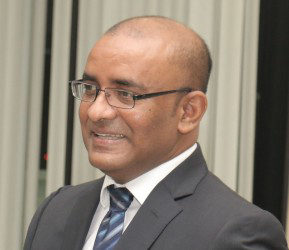Opposition Leader Bharrat Jagdeo yesterday confirmed that President David Granger has written to him clarifying his criteria for nominees eligible to be appointed as the Chairperson of the Guyana Elections Commission (Gecom) and disclosed that the information will be discussed with civil society members in the coming days before a new slate is submitted for consideration.
Jagdeo has assured that a copy of the letter, which was received last Friday, will be made public sometime this week.
“I plan to make public the letter early in the new week. I want to meet with …the civil society groups to discuss the letter as well as to solicit some new nominees,” he told Sunday Stabroek when contacted.

He had met with these groups prior to submitting the list of nominees that Granger eventually rejected.
When asked about the clarifications given by the President, Jagdeo opted not to disclose them. “Not at this time,” he said.
Granger had indicated that the list of nominees submitted by Jagdeo, in keeping with his constitutional duty, was unacceptable. Granger has signalled his preference for a candidate who is/was a judge or eligible to be a judge, as opposed to merely a “fit and proper” person, which are all catered for in the Constitution.
Since then, the two sides have been haggling over the criteria for the nominees for the post and the definition of a “fit and proper” person.
Article 161 (2) of the constitution states, “Subject to the provisions of paragraph (4), the Chairman of the Elections Commission shall be a person who holds or who has held office as a judge of a court having unlimited jurisdiction in civil and criminal matters in some part of the Commonwealth or a court having jurisdiction in appeals from any such court or who is qualified to be appointed as any such judge, or any other fit and proper person, to be appointed by the President from a list of six persons, not unacceptable to the President, submitted by the Leader of the Opposition after meaningful consultation with the non-governmental political parties represented in the National Assembly.”
Granger met with Jagdeo at State House after the latter’s request for clarifications on several issues, including the Gecom Chairman, earlier this month.
Following the meeting, Minister of State Joseph Harmon, according to a Ministry of the Presidency press release, said that Jagdeo requested clarification with respect to the qualities of the persons to be included on the list. He disclosed that the Attorney General gave a clear explanation as to what, according to the Constitution, was “fit and proper.”
“His Excellency did elaborate a little more on that and he identified the three ‘I’s,’ which is to say that the person must be a person of integrity, the person must be a person who is independent and the person must be someone who is impartial,” the Minister was quoted as saying.
Additionally, Granger, the release said, undertook to prepare a letter outlining the qualities he expects in a nominee to further guide the selection process.
Harmon added that while a date for the next engagement with the Opposition Leader has not been fixed, there is not going to be much delay in concluding the issue.
The list submitted by Jagdeo did not include a judge; rather, it comprised candidates that he felt could qualify under the “fit and proper” proviso. They were: chartered accountant and lawyer Christopher Ram; business executive Ramesh Dookhoo; author and Indian rights activist Ryhaan Shah; historian Professor James Rose; governance and peace practitioner Lawrence Lachmansingh; and former Chief of Staff of the Guyana Defence Force and mining company executive Norman McLean.
The meeting with the president followed two earlier meetings between opposition MP Anil Nandlall and Attorney General Basil Williams, SC, which did not settle the matter. The opposition has publicly said that those engagements offered no clarity on the issue. It was at this point that Jagdeo requested Granger’s intervention.
Last weekend, Senior Counsel Ralph Ramkarran, writing in his Conversation Tree column, said that the country’s leaders have an obligation to rise above differences and agree on a Chair of the Guyana Elections Commission as a unilateral appointment can seriously jeopardise democratic gains.
“Our fragile electoral peace, although punctuated by violence and the refusal of the losers to accept election results, the latter of which has prevailed in relation to every elections since 1992, can only be sustained if the basic electoral reforms implemented since 1992 are retained. If the stalemate in the appointment of a Chair eventually leads to the unilateral appointment of a Chair of the Elections Commission, all that so many thousands of people have fought for and for such a long time, will be placed in serious jeopardy. All bets about tolerating elections results, however truculently, will be off,” he warned.
Ramkarran, who once served as an elections commissioner, said that while the formula for selecting a Chair is constitutionally enshrined and must be formally adhered to, it does not preclude the leaders from informally suggesting names and one of those names getting onto the list.
“If the situation arises where the President seeks to appoint a judge, a former judge or a person qualified to be a judge, Guyana’s entire future as a democratic polity, albeit with profound challenges, will be in jeopardy. The unwritten rule that fundamental changes to electoral practices since 1992 should not be undertaken without broad consensus, notwithstanding the letter of the law, must not be allowed to fall apart,” he added.
A two-term Speaker of the National Assembly, Ramkarran said that the opposition appeared to have decided early on that the PPP/C will not go the legal route and challenge President Granger’s interpretation of the constitutional provision on the appointment of a Chair but to give the President the benefit of the doubt and co-operate in finding an agreed candidate.








